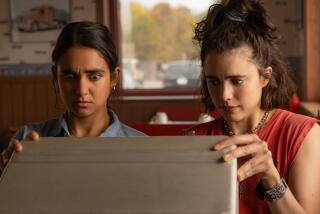Unlikely characters muddle this ‘River’
- Share via
Actor-TURNED-DIRECtor Chris Eigeman is perhaps best known for his roles as the spiky preppy from Whit Stillman’s 1990s lockjaw trilogy (“Metropolitan,” “Barcelona” and “The Last Days of Disco”), a persona he has more or less reprised in turns on the “Gilmore Girls” and “The Treatment,” in which he costarred with Famke Janssen. So it comes as a surprise to discover that his first film as a director dwells in a different social stratum entirely.
Well, maybe not entirely. “Turn the River” kicks off with Gulley (excellent newcomer Jaymie Dornan), a middle school-aged boy, leaving his Manhattan private school dressed in a navy sports coat, striped tie and khakis. He’s on his way to secretly meet his mother Kailey (Janssen), a drifter, cardsharp and pool hustler. To this unlikely pairing Eigeman adds Gulley’s father, David (Matt Ross), a quietly milquetoast alcoholic ex-seminarian; David’s mother, Abby (Lois Smith), an iron-fisted dowager and fervid Catholic who tore up her son’s family; and Rip Torn as Quinn, the owner of a seedy pool hall as well as Kailey’s mentor and go-between. It’s hard to imagine a more unlikely confluence of characters -- even after an explanation is provided, it’s impossible to see David and Kailey having ever been in love -- and the setup feels more engineered than organic.
So, for that matter, does the central theme of hustling -- a fairly ham-fisted metaphor for what Kailey must do to win her son back from the outwardly respectable, inwardly crumbling family that took him. Not only does Kailey not share custody of Gulley with David, she doesn’t have basic visitation rights. She’s reduced to writing her son in secret and setting up clandestine dates with him in the park. An unlikely story, considering that courts favor mothers, and that for all of Quinn’s references to Kailey looking “terrible,” she actually looks like an Upper East Side trophy wife on her way home from yoga.
The main problem with “Turn the River” is that it’s a well-acted, if not terribly well-crafted, character-driven drama without much in the way of a purpose. Unlike, say, Stillman’s films, “Turn the River” doesn’t evoke a milieu in any way that feels credible. If the relationship between Kailey and Gulley has some ring of authenticity, it’s thanks to Janssen and Dornan’s naturalistic rapport. How this rapport was developed in the first place, though, is hard to fathom, given that Abby took the kid from his mother when he was a baby. Did they meet in secret when he was a toddler too?
Meanwhile, the other characters feel one-dimensional and overdone, whether weak and villainous (Ross), crusty and villainous (Smith) or crusty and benign (Torn). And the muddiness of the story is reflected in the muddy grain of the picture, which lends a grimy quality even to the parts that probably shouldn’t have it. The story takes a severe wrong turn when, after Kailey succeeds in raising the money she needs, she decides to arm herself with a fake gun and change her custody situation the dumb and doomed way. Chekhov famously said that a gun introduced in the first act must go off by the third. But “Turn the River’s” second-act gun is just a crutch that helps the story limp toward an unlikely climax.
--
--
“Turn the River.” MPAA rating: R for language. Running time: 1 hour and 32 minutes. In limited release.
More to Read
Only good movies
Get the Indie Focus newsletter, Mark Olsen's weekly guide to the world of cinema.
You may occasionally receive promotional content from the Los Angeles Times.










